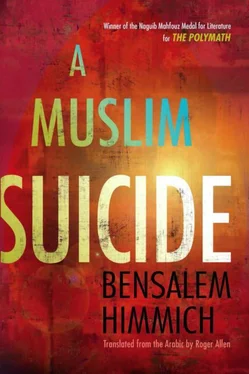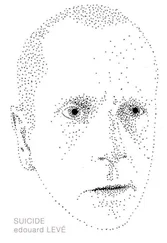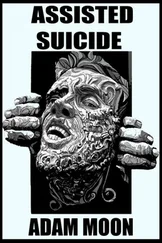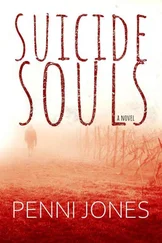I lay down on my bed and focused on the hole covered by a curtain, wondering to myself what lay behind it and where it led. While I was indulging in such thoughts, I fell into a deep sleep and only aroused myself from its restless moments after an indefinable period. As a way of using up time and confronting the unknown, I decided to follow an idea that had been dogging me for some time. I got up, grabbed a lamp, and put a dagger in my waistband. Making my way through the hole, I entered the tunnel, sometimes crawling like an animal, other times upright like a human being. After a good deal of effort I reached another wide cellar. My lamp showed that there were cracks in the ceiling through which a certain amount of light was visible, although it was partially hidden by spiders' webs. I also spotted a swarm of bats hanging from the ceiling; that made me stop moving about so that I would not disturb those blind creatures and other night animals that I could not even see, all of which would create a disturbance and bring undesirable consequences. When I listened, all I could hear was the echo of horses' hooves above me. At this point I decided that I should go back the way I came, but, before I got there, I lay flat and held my breath, as though I were in a grave or over a precipice. When I started breathing once again, I recognized it as being a welcome differentiator between life and death! I started moving again. No sooner had I reached the hole in the wall and pulled back the curtain, than I found myself face to face with Hammuda and Yasir, who both helped me to get out. In order to calm their concerns, I told them I had just needed to get some more grain, basing myself thereby on God's own words in the Qur'an: "God has made the earth for you a wide space so that you may follow diverse paths in it."
I cleaned myself off and changed my clothes. When I went back to the two men, they were both smiling broadly. I asked them what news there was, and they both shouted with glee that Sultan Baybars and his army had finally left for Egypt. I embraced them both warmly and praised God for releasing me from my troubles. I asked them what day and time it was, and they told me it was afternoon in the middle of the pilgrimage month.
"Now, Sir," said Hammuda, "it's time to go back up into the fresh air, unless of course you prefer to stay here in the cellar."
"By God," I replied, "you've have been most generous, sharing both the surface and subterranean aspects of your region. Fresh air is exactly what I need. Then I'll be going back to my residence in Mecca."
Yasir agreed with my plans. He started collecting my possessions and carrying them back up to the tent above us. We spent some time resting and had lunch together, all the while exchanging sentiments of affection and promising to meet again. Meanwhile the men were putting the baggage on the pack animals, while the women surrounded Umama and wept at the thought of her leaving them. I stood up and said farewell to everyone, one by one, especially their chief, whom I thanked profusely for all he had done for me. That done, our little caravan moved off, duly followed by prayers and good wishes.
WHEN WE DREW CLOSE TO MECCA, Yasir took over and led my wife and myself by a quiet and uncrowded back way into the city, leading to our residence. He then turned his attention to unloading the animals and transferring our baggage. I was very glad to be back, and my wife encouraged me to relax and spend some time on my own while she undertook the necessary household tasks and prayed. Having tried in vain to stem her flow of joyous tears, I left her on her own.
Ah, prayers!
I had no idea how many of them I had missed, but all I could do now was to perform as many of them as I could and more. Thus it was that, in addition to the normal prayers, I performed liturgies and extra readings till nighttime came and my wife let me know that we needed to get ready for bed.
Next morning, I decided to find out as much news as I could. Ghaylan welcomed me with open arms; in all likelihood he had known nothing about the reasons for my prolonged absence or even where I had been. Yasir surprised me by handing me a letter from Al-Shushtari. In reading it I learned that he planned to come back to Mecca as soon as his health permitted. Yasir handed me a mediumsized purse, telling me that it was a gift from the pilgrim whose daughter's life I had saved. When I looked inside, it was to find a whole pile of gold coins and jewelry. I told Yasir and Ghaylan to take their due share of the gold pieces and to distribute the rest as alms. I gave Umama all the jewelry. I asked Yasir for news of Abu Numa, the governor. Had he been asking for me? He replied that the governor had been away from Mecca for some considerable time, touring the cities in the Hijaz. His chamberlain and a small group of sharifs were acting in his place.
I now eagerly headed for the sacred enclosure of the Ka`ba and spent the entire day inside, praying, contemplating, and talking to whoever happened to approach me for alms, assistance, or legal advice. It was not long before a cluster of students gathered around me, praising God for my safe return and begging me to resume my classes as soon as possible. I promised them to do so and told them to read certain source-works that I named for them. A little while later, I joined the congregation in performing the evening prayer. As it came to a close, I noticed a neatly dressed and respectable-looking man directly opposite me. He responded to my greeting and sat down beside me. I remembered that he was Shaykh Safi al-din from India; I had met him two years or more ago in Mecca. He had borrowed a copy of Escape of the Gnostic from me, along with some of my epistles, saying that he would want to discuss them with me once he had read them. Now he offered to give them back to me, but I let him keep them as a gift. I invited him to walk with me outside the mosque, and he readily and joyfully agreed.
As we were walking amid the hubbub of the city's streets and squares, he started citing the text of complete pages from my works, particularly those concerning inquiries into the modes of knowledge of the true nature of things. I let him talk as much as he wanted, hoping to avoid any kind of argument-something that at this juncture I certainly did not need. But he soon paused for a moment and unloaded a whole series of questions and comments that showed clearly how enamored he was of the philosophical side of things and particularly Aristotle and his school. When he asked me to justify one parameter of philosophy and no others, I had to respond.
"When you have reached the age that I have and are in the situation in which I find myself," I said, "philosophy involves a concern with death and rediscovery of those divine recesses hidden within me. I am that Possible Existent, a part of the Necessary Existent, He who is eternal, possessor of the beautiful names and the heavenly kingdom."
"But then what?"
"That's it! Time, place, and circumstance do not allow for anything else."
The man was perplexed and asked me to elucidate.
"My dear Safi al-din," I told him, "if you are in quest of a philosophy that differs from what I have presented and extolled here, then seek it where you wish and delve into virgin fields, such as history, its events, eras, and vicissitudes. In order to do that, you should leave Mecca the honored city and the Hijaz in general. If you find my lengthy stay here peculiar, then you need to understand that Mecca and its noble Ka`ba are my final resort in life and my enduring residence. In no other place within Islam's dominions will I feel protected and safe."
My companion leaned over and embraced me, showing me that he had fully understood what I was saying. With that, he said farewell and retraced his steps.
Читать дальше












